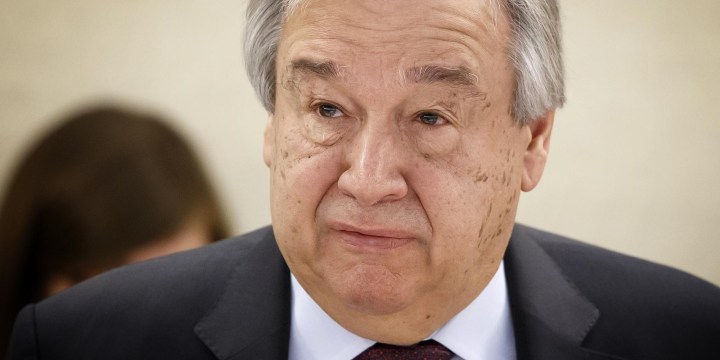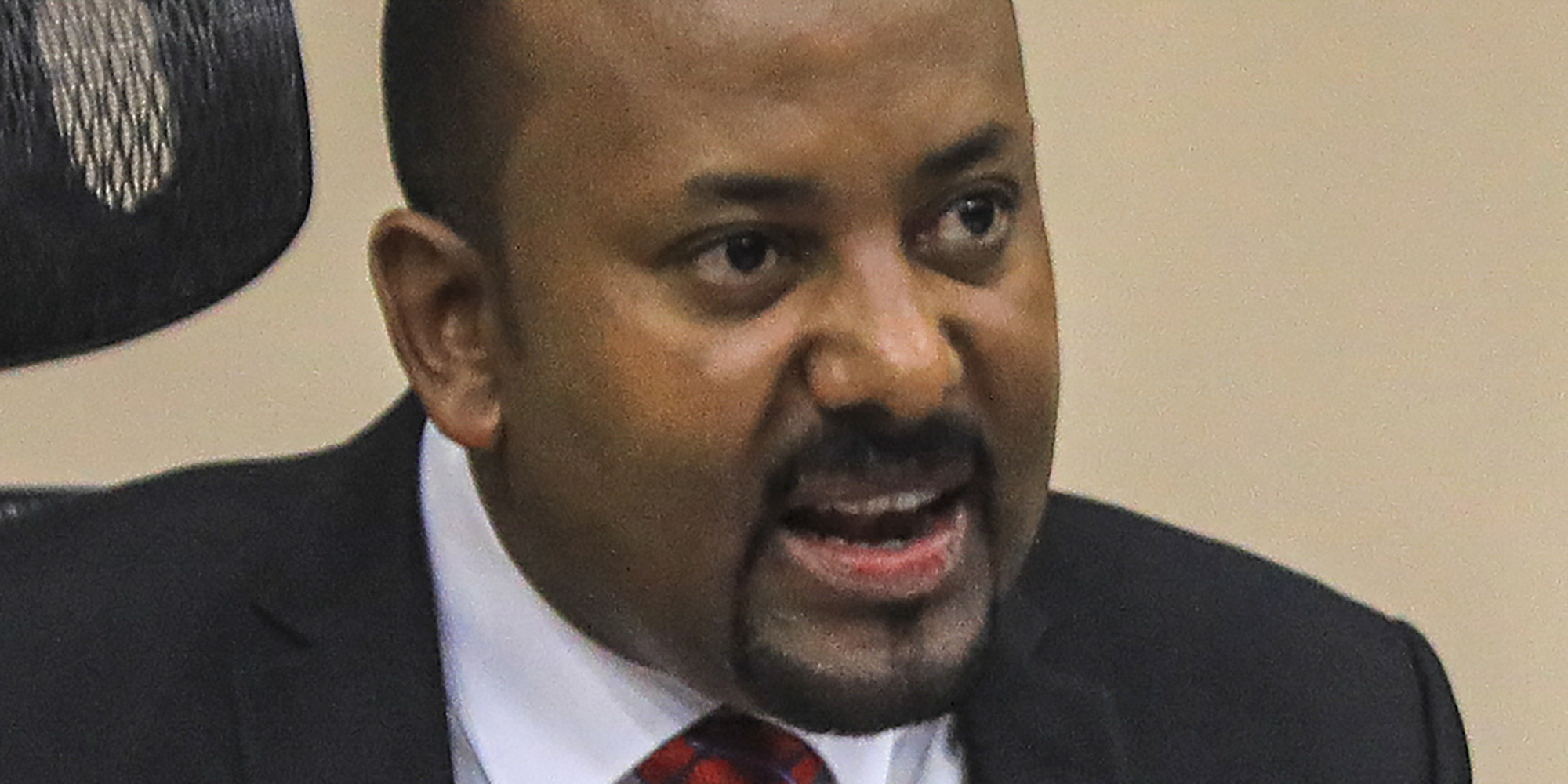HORN OF STRIFE
Secretary-General António Guterres shocked after Ethiopia expels seven UN officials – including a South African – for ‘meddling’ in internal affairs

Addis Ababa gave the seven officials working on humanitarian affairs and human rights just 72 hours to leave, saying they were ‘meddling in the internal affairs of the country’.
Ethiopia has expelled seven United Nations officials – including a South African – for “meddling” in the humanitarian crisis provoked by Addis Ababa’s war with its Tigray regional government.
On Tuesday, the UN humanitarian chief, Martin Griffiths, warned that a famine was erupting in Ethiopia’s Tigray province because of a de facto government blockade of food, medical supplies and fuel. Addis Ababa appeared to be retaliating to this, when it gave the seven officials working on humanitarian affairs and human rights just 72 hours to leave, saying they were “meddling in the internal affairs of the country”.
UN Secretary-General António Guterres said he was shocked by the expulsion order, which included senior humanitarian officials, as the UN was “ delivering lifesaving aid – including food, medicine, water, and sanitation supplies – to people in desperate need. I have full confidence in the UN staff who are in Ethiopia doing this work.”
He said he was engaging with the Ethiopian government “in the expectation that the concerned UN staff will be allowed to continue their important work”.
One of the seven UN officials ordered to leave, Grant Leaity, the deputy humanitarian coordinator for Ethiopia in the Office for the Coordination of Humanitarian Affairs (Ocha), is a South African, from Johannesburg. The others are from Ocha, from the UN Children’s Fund, Unicef, or from the UN Commission for Human Rights.
The New York Times reported this week that at least five million people in Tigray urgently needed help, but only 606 trucks have been allowed to enter the region since July 12. These had brought barely one-tenth of the supplies needed to avert a catastrophic famine, according to UN officials.
The paper quoted an unnamed aid official as saying that on Thursday, Ethiopian officials had forced 10 aid workers to get off a UN flight into Tigray, telling them they lacked the necessary paperwork.
The New York-based advocacy group Human Rights Watch (HRW) has urged Africa’s leaders who attend the inauguration of Ethiopian Prime Minister Abiy Ahmed on Monday to persuade him to address the humanitarian and human rights crisis in his country’s war-torn Tigray province.
President Cyril Ramaphosa will not be among them. His office told Daily Maverick he would not be attending the inauguration.
Abiy has fallen far from grace, and quickly, in the eyes of the world. He took office for the first time in April 2018 and won the Nobel Peace Prize in 2019 for making peace with Ethiopia’s neighbour Eritrea and starting to liberalise Ethiopia’s authoritarian politics. But his attempts to centralise power in the ethno-regional federation provoked a war with Tigray in November last year. This prompted accusations of widespread human rights abuses by Ethiopian troops and their Eritrean allies in Tigray, as well as by Tigrayan militias.
Abiy’s Prosperity Party won a clear majority in June elections and so he will be sworn in to a second term next week, despite elections in some regions only being held this week and no polling having yet taken place in most of the war-torn northern province of Tigray.
HRW’s African advocacy director, Carine Kaneza Nantulya, said at a briefing on Thursday that other African leaders should urge Abiy to allow unfettered humanitarian access to Tigray’s war zones, to restore basic services which had been cut off and to hold accountable Ethiopian forces responsible for human rights abuses.
She noted however, that Abiy had so far rebuffed outsider intervention, including a mediation effort by special envoys despatched by then African Union chairperson Ramaphosa, a commission of inquiry by the African Commission on Human and Peoples’ Rights and a demand by Africa’s representatives on the UN Security Council – Kenya, Niger and Tunisia – that he should withdraw Eritrean forces from Tigray and regional militias from neighbouring states and begin negotiating with the Tigray People’s Liberation Front (TPLF) – his military foe.
Last week, Abiy also rejected a threat of sanctions from the US, saying he would not “succumb to consequences of pressure”.
HRW’s Horn of Africa director, Laetitia Bader, said although the fighting had recently diminished it had not ended. And the United Nations was expressing concern about an effective blockade of Tigray which had already lasted three months.
Though the federal government in Addis Ababa claimed it was now allowing humanitarian access, the humanitarian community on the ground had said the trickle of aid getting through was not enough to address the massive needs of the people.
Bader said the restriction on humanitarian access was not the only cause of the crisis. It was also caused by restrictions on basic services, such as electricity, communications, banking, and access to cash.
She added that Ethiopian forces and their allies – mainly the Eritrean army – had committed numerous violations of human rights and laws of war since the fighting between the Ethiopian federal government and the TPLF government in Tigray erupted in November last year.
These violations included massacres, sexual violence, forced displacement and deliberate attacks on civilian infrastructure such as hospitals. HRW had documented widespread looting not only of medications but also of hospital beds and generators, such as in the town of Axum.
This had aggravated the suffering of the victims of the war, including the survivors of sexual violence, by making it difficult or impossible for them to get medical assistance. An HRW report in September on violence against Eritrean refugees in northern Tigray – by Eritrean soldiers and Tigray militias – recounted nurses removing a bullet from the body of a refugee without anaesthetic.
Bader noted that the UN had reported that the warring parties were refusing humanitarian organisations access to the war zones to replace this hospital equipment.
“And if you cannot resupply hospitals, say with fridges, which have been looted throughout the region, it means you cannot deal with chronic illnesses.”
Bader also recalled that the UN had said it believed that there was now a famine in Tigray. And HRW was hearing reports of continuing human rights abuses in western Tigray, notably in the border town of Humera which is under control of the federal government and its allies.
She noted that abuses were also continuing in the neighbouring provinces of Amhara and Afar to which the violence had spread. This had caused a massive displacement of people.
Bader said that about 10,000 Eritrean refugees, many of them fleeing military conscription at home, had already been in Tigray before the conflict erupted in November. About 20,000 of them were living in two camps near the Eritrean border.
After the fighting erupted they were caught between the Eritrean forces and those of the opposing Tigrayan militias. Many were killed or suffered sexual violence by both sides.
Bader said it was critical that all warring parties protect refugees and allow them to move freely, which they were not doing.
“We have also documented in the last few months arbitrary arrests and enforced disappearances of ethnic Tigrayans outside the Tigray region, in the context of the electoral process. The elections didn’t take place in Tigray [because of the war], but the arbitrary arrests, harassment, arbitrary closures of businesses and enforced disappearances of Tigrayans in other parts of the country would also have affected their ability to take part in the elections.”
Bader explained that Ethiopia had been facing a deteriorating human rights crisis even before the war started. Up to 18 months before the conflict there had been abuses, notably in response to bouts of unrest, protests and inter-communal violence, especially in the Oromia region.
Now this sort of violence was happening in many other parts of the country, including Amhara, Afar and Benishangul-Gumuz provinces.
She said whatever concessions African leaders or others could get from the federal government to improve the humanitarian situation in Tigray would have a wider and longer impact because it would set precedents for dealing with humanitarian needs throughout the country.
This was why it was important that the African Union and African government press Abiy to observe basic laws, rules and standards around humanitarian access.
Bader said the political space for the opposition across the political spectrum had begun to shrink a year before the June elections. A key turning point was the killing of the popular Oromo singer Hachalu Hundessa, which led to massive protests and intercommunal violence in many parts of Oromia. After that, many members of the political opposition in Oromia had been arrested.
This led directly to the Oromo opposition boycotting the elections. “Two years ago all observers thought this election would be fought and played out in Oromia. But, in the end, the two main opposition parties were not part of the election.”
Opposition candidates in the Amhara region had also reported intimidation of their members and their inability to hold protests. “Similarly, in the Somali region where the main opposition group decided to boycott the elections quite late.”
Bader said when Abiy came to power in April 2018 he had given commitments to ensure accountability for past abuses, including those by government forces. This had not happened, nor had there been accountability since then, such as for government forces using violence against protesters in Oromia in October 2019.
“We have not seen commitments in discourse converted into credible accountability for abuses,” Bader said. She also criticised the German government for awarding its German African Prize to Daniel Bekele, the head of the official Ethiopian Human Rights Commission.
Bader said that in the current environment of scepticism among Ethiopians about all government institutions this had sent the wrong message.
Kaneza Nantulya said the African Union had been “ineffective” in the Tigray dispute and should be reminded that it was once an institution that catered for the interests of its citizens and fought for the preservation of rights and for the dignity of African men and women.
“Because if it fails in Ethiopia, it will fail all of us,” she said. DM


















 Become an Insider
Become an Insider
Shocked? After all that’s happened, how can one even be surprised? Nobel Peace Prize? Why hasn’t it been taken back? Anyway, it has been totally devalued.
Agreed ! This notion of ‘internal affairs’ (as compared to what?) needs unpacking. Like in so many authoritarian and fascist states, it means the ‘right’ of a regime (ruling elite) to do whatever it likes, including the abuse of human rights ! Incidentally it also applies to regimes like that of Israel (junior partner of the US) to use their military power to commit heinous crimes in the name of ‘security’ ! Abiy is the latest of a long list of popular ‘dictators’, whose lust for total power knows no limit.
It is technically correct to say that Tigray did not participate in the elections but this was because they had decided to have their own elections — one of the many reasons Abiy has chosen to wage war on the territory.